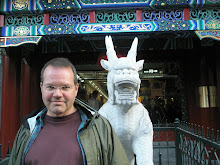Nassim Nicholas Taleb begins part 2 of his book, The Black Swan: The Impact of the Highly Improbable, with three technologies considered by many to have the most impact- the computer, the Internet and the lasers. All three, he contends, were unplanned, unpredicted and initially, unappreciated. Their impact is far reaching. Even those in deepest, darkest Africa, without a computer and access to the World Wide Web, have been touched by these technologies. So what is one to do, if the world is going to be dramatically changed by things beyond our vision and control? I have found one of the best strategies for coping with change is to stay flexible and adaptable. Sure, it would be great to be the rock in the middle of the stream, around which all change must flow however, look at what happened to such rocks as Sony’s Betamax, the Sony Walkman, Woolworths, Bombay Company, Circuit City and the Polaroid instant camera. Look at what is happening to Blockbuster’s video business. Charles Darwin said, “It is not the strongest of the species that survive, nor the most intelligent, but the one most responsive to change.” Certainly an individual, like a company, that knows its core values and abilities is well positioned to respond to change. In his epic 1960 article, “Marketing Myopia” (which is essential reading), Theodore Levitt cites the example of Dupont, which took its tremendous technical expertise at its core and met customers’ changing needs, growing the company far beyond nylon. If you are good with numbers, no matter what happens, you will still be good with numbers. It all depends what you do with this ability. It never hurts (in fact, I have found it certainly helps) to expand your core abilities. Continuous learning can be done either in school or out. “The school of life is always in session”, to quote Charles T. Munger, who is Warren Buffet’s partner in Berkshire Hathaway and one of the 400 richest men in the world. There is a side benefit of learning new things in that it is learning is itself a skill. As things change, it helps to pick up something faster than the next guy, Knowing your core will allow you to respond to change. Expanding your core will improve your ability to respond to change. Knowing your core abilities is at the heart of the “So, tell me a bit about yourself” exercise (at tellmeabit.com). It also helps to embrace change, but change is scary and not easily embraced. For an excellent article, see Dave Cheong’s blog at davecheong.com.
For some help in preparing for the unexpected, please visit www.tellmeabit.com
Subscribe to:
Post Comments (Atom)

No comments:
Post a Comment